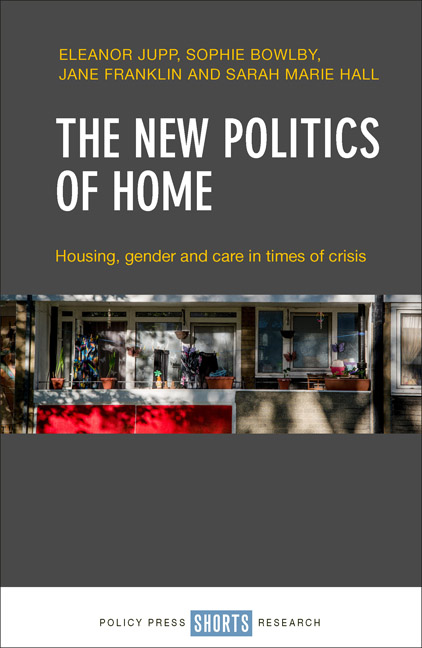Book contents
- Frontmatter
- Contents
- Notes on the authors
- Acknowledgements
- one Introduction: the new politics of home
- two Home economics: home and care in neoliberal policy
- three Caring in domestic spaces: inequalities and housing
- four Relational biographies in times of austerity: family, home and care
- five Spaces of care beyond the home: austerity and children’s services
- six Conclusion: opening up the politics of the home
- Notes
- References
- Index
two - Home economics: home and care in neoliberal policy
Published online by Cambridge University Press: 30 April 2022
- Frontmatter
- Contents
- Notes on the authors
- Acknowledgements
- one Introduction: the new politics of home
- two Home economics: home and care in neoliberal policy
- three Caring in domestic spaces: inequalities and housing
- four Relational biographies in times of austerity: family, home and care
- five Spaces of care beyond the home: austerity and children’s services
- six Conclusion: opening up the politics of the home
- Notes
- References
- Index
Summary
Introduction
As discussed in the previous chapter, women do the majority of care work, and home is the place where much of this work is done. In this chapter, I explore how the home and the caring work that women do are taken for granted in UK social policy today. It is a feminist enquiry into how home is framed in policy language to make intimate and personal resources economically available for the informal delivery of social care. ‘Home’ is a small word with universal resonance, with as many meanings as there are individuals. The word ‘home’ evokes intimate relationships and personal life. It is the space of belonging and belongings, usually but not necessarily located in concrete living spaces. Home signifies the emotional in relation to the physical, the private in relation to the public, the social in relation to the economic, and informal in relation to formal care. In contemporary politics and policy- making ‘home’ is pared down to its economic utility, to extract resources that are useful to governments who are committed to transferring responsibility for care from the state to communities and individuals. While there is a growing sense in public discourse that people prefer to be cared for at home, there is not the same level of debate as to who will be at home to care and what kinds of homes are appropriate – questions that raise issues of social and economic inequalities (Martin- Matthews 2007). Home carries the weight of women's day- to- day lives and is the ground of feminist politics. If home, and by implication women's unpaid and low- paid labour, is categorised as a useful economic resource, the intimate and political qualities of home fade into the background.
Overall, the chapter questions how women's caring and domestic work is politically arranged to maximise economic utility. It analyses how home is evoked and shaped in policy language, how the core policy problem is defined and how economic subjects and material resources are named and captured. The enquiry is guided by feminist genealogy which, as Nikolas Rose points out, ‘is not a methodology, but a means of distancing oneself from certain conceptual tools which have a powerful hold over critical thought’ (Rose 2017: 33).
- Type
- Chapter
- Information
- The New Politics of HomeHousing, Gender and Care in Times of Crisis, pp. 13 - 38Publisher: Bristol University PressPrint publication year: 2019



